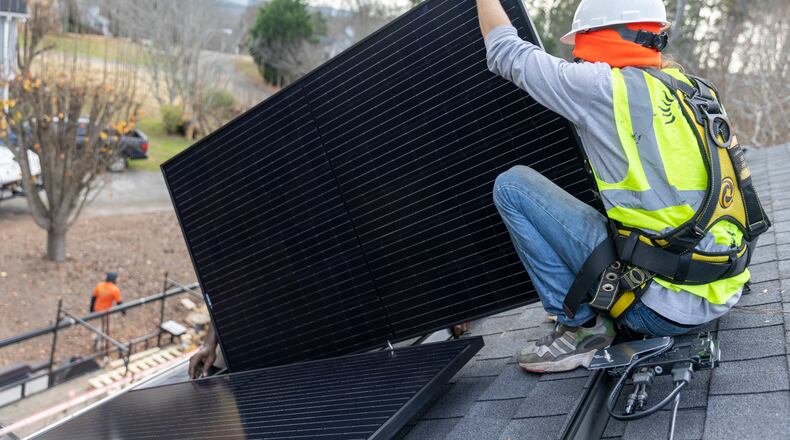I’m a Georgia capitalist. Family investors and I grew a regional family business into a multibillion-dollar international company. I care deeply about our state, our economy and our future.
But I’m also a realist. So while I appreciate that burning fossil fuels for power, heat and transport enabled a hundred years of American businesses to flourish, I can also clearly see the unintended side effects.
Burning fuels to power our economy has resulted in a thickening blanket of carbon pollution, bringing with it unbearable heat, more destructive hurricanes and floods, and dozens of clear signals that we must shift to a new, clean energy economy. That transition is already underway and I am optimistic about its prospects.
The early opportunities of the carbon era are now being recreated in the booming renewable energy era. I see new industries, new companies, and new jobs. I see my neighbors installing solar panels and buying electric cars and pickups. I see Georgia Gov. Brian Kemp announcing that NVH Korea will build a $72 million electric vehicle supply plant in Henry County. Investors are crowding into solar, wind and electric vehicle opportunities, plants are being built and Georgians and others have begun working in this new economic boom.
This is an organic, grassroots opportunity for American entrepreneurs to engage in a transformation that will drive the new economy. Who benefits? The five-employee rooftop-solar contractor who lives next door. The young woman down the street now training to service the all-electric Ford F-150 pickup. The 50-year-old technician with a year-long backlog of heat pump customers.
We built last century’s carbon economy and flourished then. We will build this century’s clean economy and flourish now.
I foresee a future full of solar panels, wind turbines, electric cars and trucks and micro-grids powered by a new generation of small modular nuclear reactors. I envision a gradually decarbonizing economy with new markets and new opportunities. An economy unconstrained by old economic rules, old monopolies, and giant 20th century corporations. An economy driven by a more responsible capitalism.
For some, letting go of our carbon-fueled existence won’t be easy. Just as some people clung to the horse and buggy, some will cling to the old, dirty fuels we came to rely upon. It took more than a century to build the old economy and transformation doesn’t happen overnight.
But I am optimistic, because the cost of solar and wind is now lower than the cost of coal and gas. Just a few years ago this seemed unthinkable. But as often happens, technology and capital investment have driven costs down so much that the clean energy of the future is now cheaper than the dirty energy of the past. All great problems ultimately yield to enough money and brainpower.
I am not alone in my optimism. A flood of investment capital is shifting from the old economy to the new. Last year, for the first time, investment in solar outpaced that in oil. Money is moving into everything from cheaper solar cells, wind turbines, electric vehicles, batteries and charging stations. And a new generation of nuclear plants herald a more reliable and efficient power grid.
Half of all car sales worldwide will be electric by 2035, according to Goldman Sachs. GM and Ford are all-in, and Ford announced a $9.2 billion federal loan to build three giant EV battery factories – the largest government automaker loan since the Great Recession. Automakers and others have bet on a new era of clean energy and private investors want in. With that new plant in Henry County, Georgia has landed 40 EV-related projects bringing $22.7 billion in investment and 28,400 jobs over the last three years.
The global clean energy race is on, and America is getting on the track, too. We can either watch from the sidelines or join the competition. As a capitalist, I’m not much of a sidelines fellow, so it’s great to see other Georgia investors running alongside me.
Roy Richards Jr. is chairman of Georgia-based Southwire, which was founded by his father. He is also the founder or co-founder of several environmental nonprofit organizations, including Terrah Conservation Capital.
About the Author
Keep Reading
The Latest
Featured


